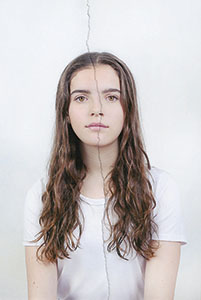False Beauty: Manipulation of Reality
In 2017 The Royal Society for Public Health surveyed over fifteen hundred young adults, under the age of twenty five, to determine the impact digital media and image manipulation applications were having on their metal well being. The survey results identified that anxiety and mental health issues had increased by seventy percent in the last decade in this generation. It also identified that their had been an increase in body issues in young girls. The society linked this increase to the rise of the use of image manipulation on social media sites. Reflecting on the outcome of this published research has conceptually inspired this photographic project, False Beauty:Manipulation of Reality. The concept of this project was to explore the manipulation of young adults portraits to conform to societies perceived rules to beauty. The ethos of this project was to deconstruct the image to “ manipulate reality”, and challenge the idealised aesthetics of false beauty. The process of image deconstruction is the polar opposite to the image enhancement tools used in modern image manipulation. The creative concept of image deconstruction was inspired by research into image manipulation techniques used as a form of protest. This research identified that Dada artists used photo-montage as a creative tool for propaganda and protest. Using a variety of processes this project captures a selection of simple portraits, of young adults, and presents them paired with an manipulated image as a visual protest against the use of image manipulation, to conform to societies perception of beauty. This ideal beauty though is often based on false realities. The images in this photographic essay are presented as small rectangles which replicate the image formats of social media sites. Undertaking this project has made me reflect on the way I present myself on social media sites and how image manipulation affects my own well being. I have captured these emotions in a series of images at the end of this photographic essay. These images represent how I use social media filters to cover my face and hide from the true reality of who I am and what I look like. I recognise that as an adult I am also influenced by the effects of social media and image manipulation. To support the emotional impact on young adults, identified in the research for this project, I have documented some of the words described in the survey results and my own research. I have also shared some of my emotional thoughts in this way. These words are written in light text to reflect how these emotions are often hidden and not shared and therefore have a detrimental affect on our mental well being.
